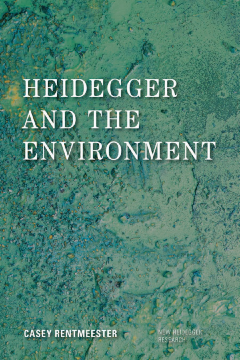
Additional Information
Book Details
Abstract
In the past few decades, it has become clear that the Western world’s relation to nature has led to environmental degradation so wide-ranging that it threatens the existence of human civilizations as we have come to know them. The onset of anthropogenic climate change and the increasing threats of resource depletions are the most obvious signs of an environmental crisis.
This book attempts to examine the metaphysical underpinnings of our current environmental crisis, thereby viewing it from a philosophical perspective. Using Martin Heidegger’s writings on the history of being as its lynchpin, it examines how humans have come to view nature as a giant array of mere resources to be maximally exploited. Following Heidegger, Casey Rentmeester argues that this understanding of nature is rooted in the understanding of what it means to be that came about in ancient Greece. Rentmeester then utilizes elements of Heidegger’s post-metaphysical later philosophy and aspects of early philosophical Daoism to create an alternative way to think about the relation between humans and nature that is environmentally sustainable.
This study is a thoughtful and pioneering example of climate philosophy: the engagement with the Earth systems crisis from an existentialist perspective. The crisis is a game changer, raising the question of what ideas should be part of our survival gear. Rentmeester makes a compelling case that Heidegger, read through a Daoist lens, is a guide to a sustainable future.
Martin Schönfeld, Professor of Philosophy, University of South Florida
Heidegger and the Environment breaks new ground in both ecological and comparative philosophy. With clear prose and rigorous scholarship, Casey Rentmeester reminds us that, amidst all of the controversy, Heidegger’s thought provides a vital response to our planetary emergency and a way to rethink how humans dwell on the earth.
Kevin Aho, Professor of Philosophy, Florida Gulf Coast University
This is a thoroughly researched study of a timely topic: how Heidegger’s ideas can help us think about the environment and climate change. Rather than applying ethical theories, Rentmeester pursues a fundamental question of environmental philosophy, which concerns ‘our proper relationship to the natural world’. Especially opportune is the last chapter’s comparison with Chinese Daoism.
Graham Parkes, Professor of Philosophy, University College Cork
Casey Rentmeester is Assistant Professor of Philosophy at Finlandia University in Michigan’s Upper Peninsula. He has published numerous articles on Continental Philosophy, Environmental Philosophy and Chinese Philosophy.
